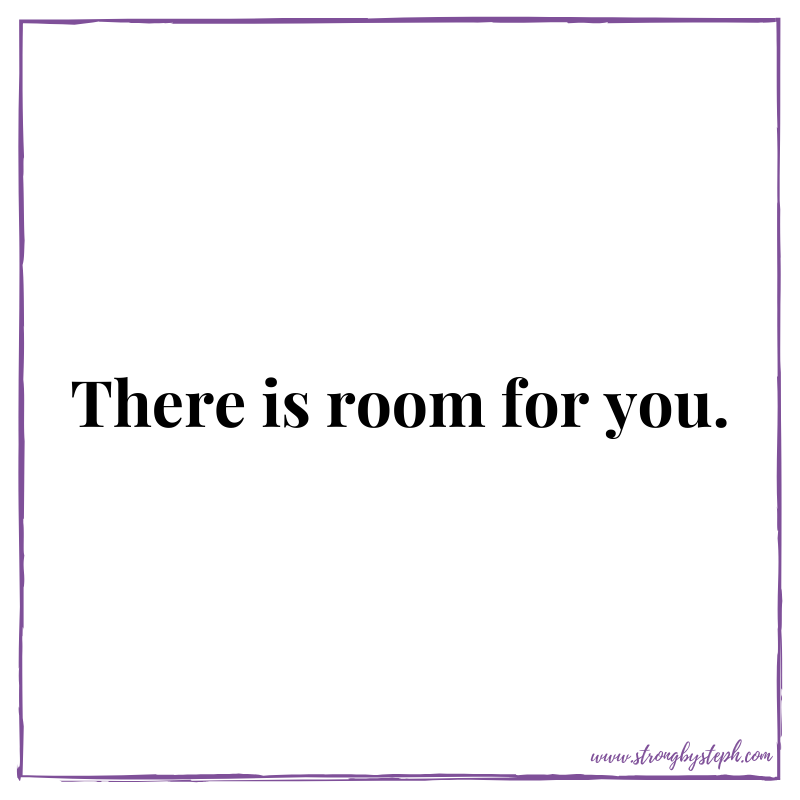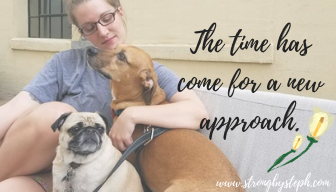We often do not separate our beliefs about our physical bodies from the rest of us, in our current culture.
We try to pretend like we can/do, or like this programming doesn't run deep snaking its tentacles into every crevice of our lives, but it always catches up to us. We believe certain things about certain bodies (+ certain habits, + certain ways of showing up in our lives), and, for most of us for quite some time, we do our best to distance ourselves from the shame spiral created by a world profiting from as many people feeling as bad as possible about themselves (so we can be sold a solution). The process of shifting all these beliefs—of seeing them for what they are and how they've impacted you + those around you—is often lengthy, imperfect, uncertain.
It's also freedom and truth.
A recovery not just of your full humanity but all of ours.
You are (and we all are) so much more than a body.
Stressed? 😬 (Options for Your Training Program, + a Reminder)
“I went to squat yesterday. My warmup felt fine — I was a little tired, but I thought once I started lifting I’d feel better. I usually do,” a client said to me."When I got to the working sets, everything felt HEAVY. Like, heavier than it should have. I finished the workout anyway, because it was written down, so I had to do it. But I’ve felt like everything is heavy and takes longer than it used to for a couple of weeks now.
What am I doing wrong? Am I losing all my progress? How am I going backwards when I haven’t skipped a workout?”
Where Can It Be Easy? Where Can It Be Enough?
Learning to be with your body isn’t a math equation, and once I realized that, I started to notice how it actually felt when I wasn’t trying to force it to keep up with sky-high plans on top of everything else I was juggling in my life. Like many things, I noticed without coercion and with curiosity, I began to hear and work with myself rather than against.
I learned it feels good to me to drop all the thought threads in some swings or incline pushups at the sink or stray sets of other repetitive, mildly sweaty movements. Unbroken sets of 50 used to sound like torture to me, like a challenge that was always bigger and meatier and more intimidating. Now they sound like a lilting lullaby.
For now. That may change, as bodies and minds do.
If you’re like me and most womxn with whom I work, no motivation hack in the world is gonna make it more likely you’ll get to the gym. It’s not a desire thing; it’s an overbooked one.
The questions here, for me:
Where can it be easy?
Where can it be enough?
How would it feel good to interrupt that overwhelm shame train (not like punishment for hopping on it) and redirect its energy?
When Was the Last Time You Sat Still? (How and Why You'd Want To)
When was the last time you sat still?
No rushing around to do 17 things at once, no phone in your hand, no Paw Patrol in the background just to keep your kids quiet, not trying to meet the demands of the four people talking to you at the same damn time.
A laughable proposition, maybe, if your life feels like it's in a blender and you're doing your best to hold on.
The benefit of stillness, though, is it helps the noise begin to settle.
You Don't Have to Go All-Out All the Time (How to Adapt Your Fitness for the Holiday Season)
Ah, the holiday season is almost upon us. Can you feel it in the air?
Of course you can, because you're up to your eyeballs in the work you've been bringing home for three days, accomplished from your phone while you put Paw Patrol on (again) and throw your kid some Goldfish to have 23 minutes to yourself. You need to get ahead so you have the chance to breathe once or twice on your impending days off. You're sitting there, knowing ~self-care~ is important, and also that it feels about sixty trillion light years away, considering all the demands you've got on your plate. Your kids, your job, your partner, your babysitter, your hairstylist... they're all depending on you to hit the deadlines and make the appointments and feed everyone (including yourself). Have you gotten ahead yet? ;)
Oh yeah, and you skipped the gym (again, again).
I'm a Personal Trainer, and I Don't Care How Many Squats You Did.
What frustrates me about fitness is its pull to be reductive, to erase nuance, to make everything a 1-2-3, a tempo, a 12-step program, into which, “anyone,” can plug in and be healed/”fixed”/”better.”
But I don’t think anything in my life has worked in that cookie-cutter way, and I’d guess that’s at least as true if not more so for you, too, if you’ve found yourself in this space (thank you, and welcome, again or for the first time). That thought carries a lot of unwieldy energy, though, and it’s not very fun to think about what we don’t like or what doesn’t work for months (years) on end.
I Have an Important Question for You...
How often do you take a look at your progress?
As a coach, this is a practice in which I engage clients (and myself!) regularly. Motivation, as we tend to think of it, is fleeting; the get-up-and-go feeling doesn’t last forever. Taking stock of where you’ve been, and where you’re going, is a reliable tool to use when you’re wondering why you keep putting one foot in front of the other day in and day out.
That being said, I am a Health at Every Size-aligned coach who does not coach intentional weight loss, so my progress-tracking methods are a bit unconventional, as far as fitness goes. Rather than lining up numbers to compare and contrast, I prefer to ask more open-ended questions, leaving space for each client to discuss what they see with the goals that matter to them.
What You're REALLY Saying About Yourself When You Talk About Your Body
When you’re in the soup of diet culture, believing your (allegedly unlovable, misshapen, wrong) body is all that you are, loving it can seem so far away it feels surreal.
Learning to detach our worth from our appearance doesn’t require that we actively love every inch of ourselves. It would be disingenuous and harmful to proclaim that feeling worthy of love, respect, and belonging can only happen once you love every inch of your body. But, maybe, we could get to a place where we all realize, with every waking moment and throughout every single interaction, we are more than our bodies (easy to say we know this, but how often are you on the receiving end of judgments about your ability to perform at work because of your gender presentation, for example? How often do you make assumptions about someone's strength or stamina because of their body size?).
When working with body image clients, one of the first things I invite them to do is to examine the language they use to describe their bodies. It is often illuminating how potent that vitriol can be.
Is it any wonder self-love feels far away when the script we play is a constant stream of, “gross,” “sluggish,” “lazy,” “flaky,” “undisciplined,” and the like?
How to Get Started When You're Nervous to Start (A Step-By-Step Guide)
COURAGE, the cowardly dog and the secret ingredient.
Making any sort of change takes an ounce or two of bravery. You know that, because those fitness/life changes you've thought about but haven't made are sitting there licking their lips and twiddling their thumbs, looming in the distance, reminding you of what you haven't done yet, which is at the very least intimidating, if not downright terrifying.
Hoards of advice would tell you to just do it anyway, that the only way to get started is to start, that the time is passing by no matter what so you might as well get to stepping. I don't disagree, and also... if you were gonna get started after hearing all that, you would've done it already ("you," is really, "we," here).
The fear will never disappear entirely, so, what then?
"You Are Not Weak for Needing Time to Rest."
^^can you relate?
(We're about to talk about shame, here, but let the record reflect, I am recovering from every week being like that meme (as in, not thinking you're broken for doing so). If you find yourself there, all the time, I promise there are lots of ways out, some more accessible than others for a variety of reasons. An important thing to acknowledge, for me, that solutions exist for a range of tax brackets. It's not all spa days and pedicures and last-minute vacations to the Maldives.)
SO many of us live our lives this way, packing them full to the brim, forgetting to allow space (for what? To relax, to be, to run errands, to even be late. ANY SPACE AT ALL). This is a byproduct of our current culture (you know, "the grind," "you can sleep when you're dead," etc.).
I write about this quite a bit, because most of my clients (and you) are high-achieving, go-getter, "good girls." We check the boxes, crush the to-do lists, do all that is expected of us.
What Is Weight Stigma? (And What Can You Do About It?)
It’s important, here, to acknowledge weight stigma harms all of us, and it harms the most marginalized among us (e.g., womxn of color who are fat, of lower socioeconomic status, and/or trans) most of all.
While it may seem a far-fetched conclusion if you’ve never experienced it firsthand, the effects of weight stigma are very real, and often show up in pronounced ways in healthcare and medical settings (which is why it has a place here, in fitness—the “average” sized womxn IS “plus size,” and part of helping someone with their health is treating them with compassion and respect, in my book). We often hear rhetoric about , “glorifying ob*sity,” and being a burden on the healthcare system, but the reality is most folks are simply trying to live and navigate an environment and a culture actively opposed to their existence (see: Today’s Dietitian for a thorough article on the prevalence of weight stigma, internalized vs experienced stigma, the health effects of weight stigma (especially in healthcare — a 2017 study found that doctors are the #1 most common source of weight-based stigma!), social media, and more).
Does It Feel Like, "Loving Your Body," Is Only For Other People?
I know many people who wake up every morning, and right before they look in the mirror to greet themselves for the day, they feel pure terror. Dread. Fear. We steel ourselves up to brace for the, "flaws," someone else has told us will be there, and we wonder how, "bad," they look that day, and the chorus starts:
"Ugh, gross."
"I can't wear that. Do I have any clean, flowy tops?"
"I'm giving a presentation today; will this hold across my chest?"
"I shouldn't have eaten ____ last night. I never get this right."
We've discussed it before, but it bears repeating: the language you're using has a measurable impact on your perspective.
Many clients come to me unhappy with their bodies, desperately hoping that the program I present will hold all the secrets to body change, and, as a result, happiness. They're disappointed to find out that it doesn't always work that way, and, in fact, countless repeated incidents of this led me to examine my coaching philosophy, such that I no longer coach with a focus on intentional fat loss.
Liking our bodies (and ourselves) is an inside job, one that can't be completed in an hour a day at the gym and a salad every night for dinner. It's a practice, and it often feels unreachable: how many times have you asked yourself, "how do I go from hating everything about my body to loving it? LOVING it?"
It seems a million miles away for a lot of us. It did for me.












